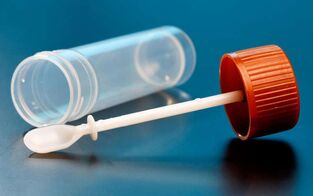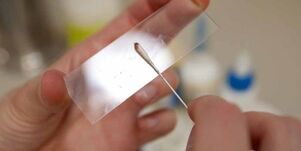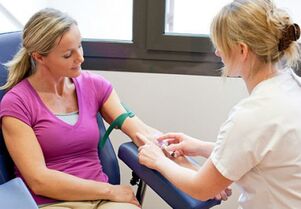What tests should be done to detect worms?
Worm tests should be performed regularly to detect the disease in a timely manner. The most famous of these is fecal analysis, which is done before work or a trip to a sanatorium, but this is not the only and not the most reliable way to identify parasites. A combination of tests will give the most accurate answer.
What tests are available for worms
The list of tests that must be done to detect parasites is quite long.
The main ones are:
- Stool analysis, also known as worm eggs, is the most common method. Pros - mass use, no complicated equipment needed. Minus - lack of accuracy.
- ELISA, also known as a blood test for worms. Advantages - high accuracy. Disadvantages - reveals only certain stages of parasite development, in other cases the result will be questionable.
- Analyzes of other biological agents (urine, sputum, duodenum, epidermis). Advantages - allows you to detect parasites in those locations that are not accessible to other analyzes. Disadvantages - related to significant upset for the patient.
Usually, a patient is prescribed a combination of multiple tests to detect the parasite. The criterion for recovery is a negative ELISA result and several negative results of the study of the biological environment where the worms are located.
Fecal analysis for worm eggsMost of the worms live in the gut, so the most common test for worms is the stool test. It is prescribed for routine medical examinations for adults and children, before being sent to a sanatorium or children's camp, as part of a health book, during hospitalization. Also, this analysis is given by people who have come in contact with infected patients, who have eaten untested foods, who have noted characteristic worm symptoms.

You do not need to prepare specifically for the analysis, you can collect feces at any time of the day, but the most indicative is the morning stool. Immediately before delivery, you should wash the perineum to avoid urinary incontinence and discharge from the genitals.
Faeces for analysis for worms are collected in a special container. It is sealed and a special spoon is attached to collect the material. To collect the most informative piece of material, you need to take a sample from the middle of a stool section. The container should be about one-third full. You must deliver it to the laboratory the same day.
In the lab, a specialist looks at the stool under a microscope and locates the worm eggs in it. Most have a characteristic shape that allows you to accurately determine the type of worm. Based on the results of the analysis, a conclusion is issued regarding the absence of eggs or their presence and type, after which treatment is prescribed.
This is the most common but least accurate worm test. The reason is that there may be no eggs in the part that has entered the container, despite the fact that there are worms. Therefore, if the patient complains of characteristic symptoms or has come in contact with the source of the infection, they should undergo 5-6 examinations every 2-3 days. In this case, the chance of detecting parasites increases significantly. Along with the study of feces, other diagnostic procedures are prescribed.
Scratching the skin

This analysis usually complements the stool analysis. The most accurate result is achieved when diagnosing worms that lay eggs on the surface of the skin near the anus. Indications for such an analysis are routine examination of children and adults, enrollment of a child in kindergarten, school, camp or sanatorium, hospitalization of children and adults, suspected infection with cancer (itching in the anus, digestive disorders, contact with the sick). Most often, children suffer from this disease, which explains the name of the worm (childhood experience)
You do not need to prepare for the worm test, you do not have to wash the perineum - so it is possible to rinse the eggs of the parasites, you should avoid bathing or showering the night before. The analysis is done in the morning. A special membrane is used that collects material from the skin of the interglottic fold. The study is also performed under a microscope. It does not detect helminths other than pins.
Urinalysis
This test is the least commonly prescribed, as the parasites almost never live in the urine. Conditions are possible when pinworms are detected in the urine test, but this indicates a violation of the rules for closing the test - the parasites and their eggs enter the container through the skin of the perineum. Most often, this condition occurs in girls, less often in boys.
But there are still indications for testing. In the kidneys and urinary tract, live some tropical parasites, with which a person is "rewarded" by a trip to Asian and African resorts. With the increasing availability of exotic recreation areas, the spread of parasites not typical for our country is also increasing. For this reason, it is recommended that you have a urine and blood test for worms after a trip to a resort.
Types of worms found in urine:
- Trichomonas?
- Distomum haematobium;
- Filaria sanguinis hominis;
- Taqnia echinococcus.
Also in the urine may be eggs of liver parasites - echinococcus and flukes.
Sputum analysis
There are some parasites that spend all or part of their lives in the lungs. The symptoms of their appearance are not typical - bluetongue develops in the bronchi (inflammation, cough, wheezing). Hemoptysis, pneumonia of unknown origin and other effects on the lungs may occur.
Pests detected by sputum worm test:
- Ascaris - in the larval stage they need oxygen.
- Dwarf bat - lives mainly in the lungs.
- Strong myloidosis, non-catarrh - parasites characterized by intestinal localization, the location in the lungs is atypical.
No special preparation is required for sputum collection, but it is recommended that you brush your teeth and pick up the material in the morning. Before that, it is useful to drink plenty of fluids - this improves the discoloration of the sputum. The collection container should be clean, but not necessarily sterile - bacteria do not play a role in the diagnosis. In this case, both the parasites themselves and their eggs are detected. If the patient cannot cough up sputum, it is removed from the trachea using vacuum suction.
It is possible to use drugs that improve the rejection of sputum, stimulate its formation to obtain more accurate test results for worms. Combined with a blood test for worms, it gives very accurate results. Unlike stool tests, eggs are more likely to be found.
Blood test

ELISA or blood test for worms - the most accurate method to identify them. Helminths cause a strong reaction from the immune system - the content of eosinophilic leukocytes increases, the production of immunoglobulins increases and specific antibodies against parasites appear. It is at their disposal that the ELISA method has been created.
Antibodies to parasites are extremely specific - they can be clearly diagnosed, while they are present in the blood only in the presence of parasites and within 3 weeks after their disappearance.
Blood from a vein is required for analysis. No special training required. The result can be achieved within two days. The accuracy is close to 100%, the specificity of the antibodies does not allow a wrong result. The criterion for recovery is a negative result one month after treatment.
Duodenal content analysis
The bile ducts and pancreas open into the duodenum. These organs are often affected by echinococcosis and historiosis. The parasites lay eggs, which pass through the ducts into the intestine. The method of analysis for worms of the contents of the duodenum allows you to detect these diseases much more accurately than the analysis of feces.Material is obtained with a duodenal catheter on an empty stomach. If the patient has a strong gag reflex, pain relief is applied. The procedure is quite unpleasant, therefore, it is done only in cases where the results of other tests are doubtful.
When to try for worms
Worm tests should be performed in the following cases:
- The patient is experiencing symptoms of helminth infestation.
- The patient came into contact with sources of intrusion (sick, untested products, areas with adverse health environment).
- Confirmation is required that the patient is not a source of infection (employment, health records, out-of-town rest, hospitalization).
Test method for worms

To test the worms, you must have a referral from your doctor. Most tests do not require preparation and if there are nuances, the doctor will explain them when prescribing a study. Indications are required for a physician to write a referral.
In commercial clinics, you can take the test regardless of the indication. The price varies considerably. The time for receiving the results of feces and waste is about a week, the analysis of urine, sputum, blood is about 2 days, depending on the workload of the laboratory.
Which helminths can be detected using tests
Worm analysis detects most types of parasites - enteric and extraintestinal forms. The most accurate is a blood test for worms, which allows you to identify the parasite.
















































